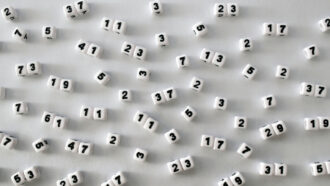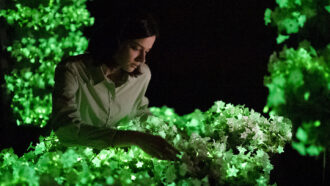Tech
-
 Tech
TechHow green is your online life?
From the manufacturing of our favorite devices to using them for social interactions, our digital lives can have a big climate impact.
By Sarah Wells -
 Tech
TechParticles from tree waste could prevent fogged lenses, windshields
A new coating made from a renewable resource — water-loving nanoparticles made from wood — could keep glass surfaces fog-free.
-
 Math
MathScientists Say: Prime number
Prime numbers’ unique quality — being divisible only by themselves and one — makes them useful for encrypting secret information.
-
 Tech
TechBits of trees can make and store energy for us to use
This cellulose and lignin, two major building blocks of trees, could lead to greener electronics.
-
 Tech
TechBionic plants and electric algae may usher in a greener future
Some can aid the climate by removing pollutants. Others would just avoid dirtying the environment in the first place.
-
 Brain
BrainScientists Say: Deep brain stimulation
Through wires implanted in a person’s brain, this medical treatment can help treat various conditions.
-
 Tech
TechHow to prevent the robot replication apocalypse
Today’s bot-building robots aren’t set on world domination. But scientists and philosophers want to keep future tech in check.
By Skyler Ware -
 Climate
ClimateHydrogen energy could help our climate — depending on its source
Hydrogen energy doesn’t emit greenhouse gases when it’s used. But how it’s produced will affect how useful it can be in slowing climate change.
-
 Tech
TechExplainer: The hydrogen rainbow
Hydrogen works the same, regardless of its source. But how clean or “green” it is very much hinges on its color-coded name — which points to how it was made.
-
 Brain
BrainLet’s learn about mind reading
In the future, more advanced, less bulky mind-reading equipment could raise serious privacy concerns.
-
 Tech
TechEngineers cook up a new way to tackle CO2: Make baking soda
Engineers have found a material that can collect carbon dioxide from the air. When later mixed with water, it forms baking soda that can be shed in the sea.
-
 Science & Society
Science & SocietyThese teens are using science to make the world a better place
Finalists in the 2023 Thermo Fisher Scientific Junior Innovators Challenge are doing projects that aim to help others.